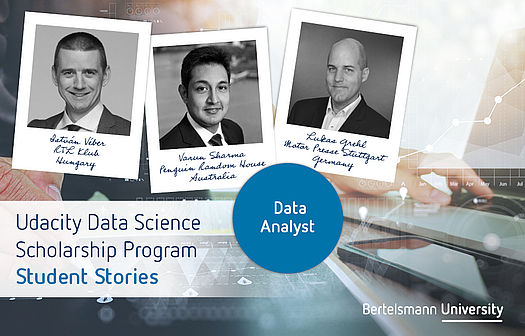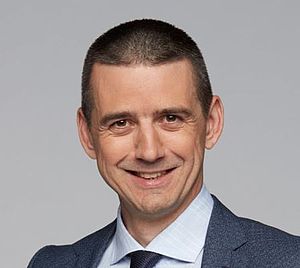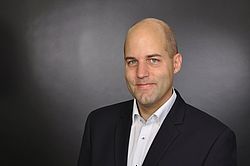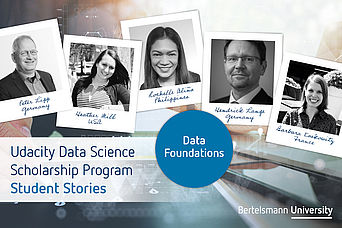 Last year, Bertelsmann, Google, and Udacity launched the Udacity Data Science Scholarship Program. As part of this continuing education initiative, employees of all Bertelsmann companies were given the opportunity to qualify for one of Udacity's three Nanodegree programs. The participants of the “Data Foundations” and “Business Analyst” programs have already described their impressions on BENET, and now, in the third and final part of our interview series, three colleagues share their experience with the “Data Analyst” Nanodegree program: István Véber, a weather presenter at the TV channel RTL Klub in Hungary, Varun Sharma, Finance Business Partner at Penguin Random House Australia’s Distribution department, and Lukas Grehl, who serves as Head of Research & Services on the Motor Presse Stuttgart.
Last year, Bertelsmann, Google, and Udacity launched the Udacity Data Science Scholarship Program. As part of this continuing education initiative, employees of all Bertelsmann companies were given the opportunity to qualify for one of Udacity's three Nanodegree programs. The participants of the “Data Foundations” and “Business Analyst” programs have already described their impressions on BENET, and now, in the third and final part of our interview series, three colleagues share their experience with the “Data Analyst” Nanodegree program: István Véber, a weather presenter at the TV channel RTL Klub in Hungary, Varun Sharma, Finance Business Partner at Penguin Random House Australia’s Distribution department, and Lukas Grehl, who serves as Head of Research & Services on the Motor Presse Stuttgart.
BENET: What motivated you to participate in the Udacity Data Science Scholarship Program?
 István Véber: I’m very interested in the explosive proliferation of data, what we know as Big Data. A lot of things are happening there right now, in various areas, whether it’s self-driving cars, trading algorithms, influencing people through news or social networks, or looking for patterns in our DNA to cure disease. We live in a very exciting world where data is everywhere and can be used for both good and bad purposes. Besides, I've always loved interesting, colorful charts (laughs).
István Véber: I’m very interested in the explosive proliferation of data, what we know as Big Data. A lot of things are happening there right now, in various areas, whether it’s self-driving cars, trading algorithms, influencing people through news or social networks, or looking for patterns in our DNA to cure disease. We live in a very exciting world where data is everywhere and can be used for both good and bad purposes. Besides, I've always loved interesting, colorful charts (laughs).
Varun Sharma: Over the course of my career I’ve sought to uncover various techniques for managing and analyzing data, so the Udacity course – supported by a forward-thinking organization like Bertelsmann and surrounded by a global community of learners – was the perfect opportunity to improve my skills. Data Science, machine learning, and AI have the potential to significantly enhance the capabilities of our species, so I’m hoping this program will allow me to start making the most of this industrial revolution.
BENET: Could you please briefly describe your learning experience for us – how satisfied were you with the content and methods?
Lukas Grehl: I really liked the part on Exploratory Data Analysis. In general, I feel the course offers a good mix of videos, quizzes and practical exercises, plus support from the community. Specifically, the Python practice in the integrated programming workspaces is very effective for learning – though it can be challenging to write the correct code, especially for a Python newbie like me. Learning completely free of time restrictions and without direct interaction was a completely new experience for me. I did most parts of the course in the evening, at weekends and on the train to work. I found out that digital learning works for me in principle, but it is good to have deadlines and you should be intrinsically motivated to succeed.
Varun Sharma: Learning in the Udacity scholarship was a lot more effective compared to university, where content was delivered through long lectures and weekly tutorials. The many projects provided a great platform for applying my new skills and receiving feedback on the quality of my work. I could also connect with my peers from around the world and benefit from the collective intelligence of the whole scholarship community. Overall the program allowed me to get a high-quality learning experience from the comfort of my own home.
BENET: What were the biggest challenges for you?
 Varun Sharma: Reigning in my curiosity and remaining focused on learning the topics on hand. The fields of data science and programming have infinitely large bodies of knowledge and the course itself provided links to a number of additional resources, so my curiosity often led me to stray away from the core concepts and immerse myself in content that wasn’t a priority for completing the program. Overcoming this urge and completing my projects on time required a significant amount of discipline.
Varun Sharma: Reigning in my curiosity and remaining focused on learning the topics on hand. The fields of data science and programming have infinitely large bodies of knowledge and the course itself provided links to a number of additional resources, so my curiosity often led me to stray away from the core concepts and immerse myself in content that wasn’t a priority for completing the program. Overcoming this urge and completing my projects on time required a significant amount of discipline.
BENET: What benefits do you expect from the Nanodegree – both personally and professionally?
István Véber: I want to learn machine learning. With this nanodegree I think I have a really good foundation to learn more. This course includes exactly what I needed to learn.
Varun Sharma: As an accountant and a finance professional, I aim to provide high quality information for decision making. This program has given me precisely the kind of skills that I’ll need to achieve that with increasingly large quantities of data. The knowledge I’ve gained will allow me to automate more calculations, improve the visual presentation of data, develop models with better predictive capabilities and create improved decision-making tools. My new knowledge should help Penguin Random House cope with increasing levels of complexity.
Lukas Grehl: The feeling when your code finally works after you got a bunch of error messages is always a highlight. Mastering more and more parts of a complex programming language was really a great experience. My company supported me during the Nanodegree and I hope that with my new qualifications I can give something back. First, I will think about ways to apply new techniques for analysis and visualization on the data sets I already work with. Second, it is possible that I can offer analyses of different kinds of data than we are currently using.
BENET: What advice can you give future participants?
István Véber: It helps to have a basic knowledge of statistics and Microsoft Excel in order to better understand the content.
Varun Sharma: Previous knowledge of a programming language, introductory statistics and linear algebra can be helpful. Udacity has some fantastic free courses on some of these topics to get individuals up to speed. Ultimately though, all you need is curiosity, consistency, and perseverance.
Lukas Grehl: You really have to be motivated to complete the course. Some tasks require a lot of time and energy and it is important to keep on track with the schedule. When you're stuck, look at the forums. You will often find help quickly. And you will see that others experience similar problems – so you're not alone.
will often find help quickly. And you will see that others experience similar problems – so you're not alone.
Bertelsmann is also using other means to advance the development of skills in the field of data analysis. Almost a year ago, the Group launched the “Median Data Science” program. It gives university graduates worldwide the opportunity to expand their data analysis skills and gain practical experience. Due to its enormous success, the program is entering its next round in 2019. Applications are open until May 25. Further information will be available on the program website shortly. (benet)
